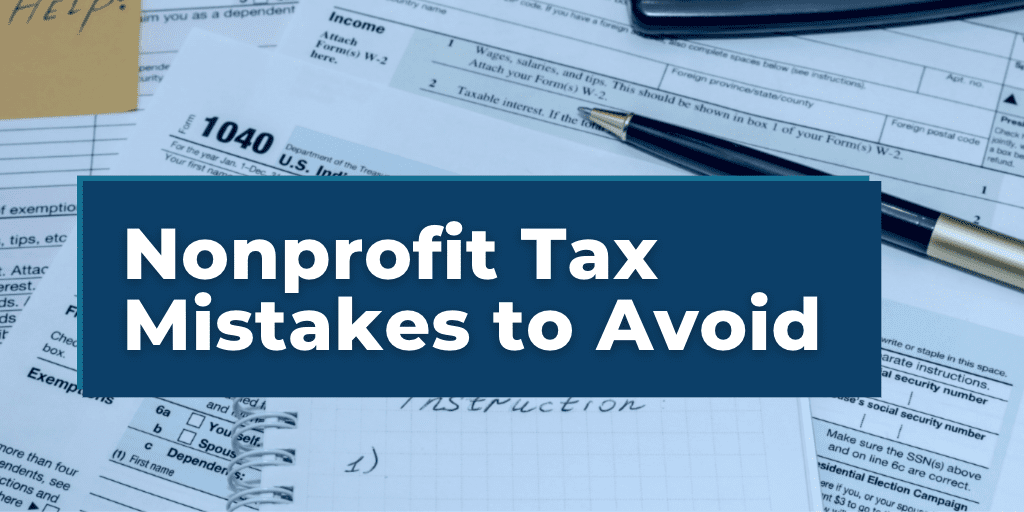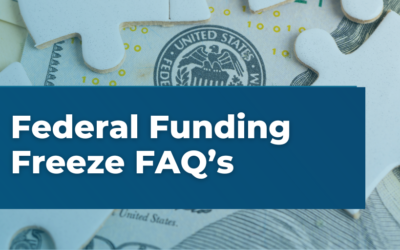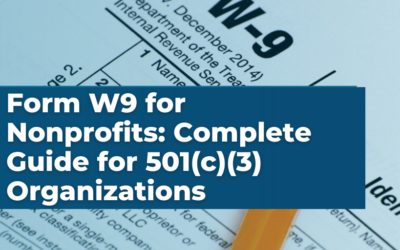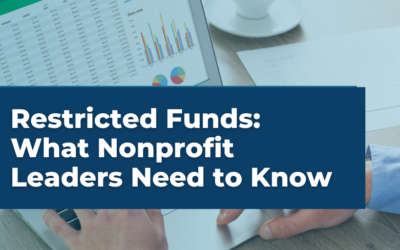Nonprofit organizations play a critical role in their community by offering essential services that have a positive impact. Obtaining and maintaining their tax-exempt status is crucial to their ability to continue making a difference, and the government strives to simplify the process to ensure they can focus on their mission of improving the world we live in. However, nonprofit organizations still need to file their taxes each year similar to how businesses do.
First, organizations need to apply for tax exemption and will be granted an EIN, or Employer Identification Number, a unique identifier used by the IRS to track tax returns and other documents. To keep their tax-exempt status, nonprofits are required to operate within the bounds of tax laws and regulations, including properly reporting their financial activities.
No matter an organization’s size, properly filing taxes can be a headache. At Velu, we’ve helped small and large nonprofits properly file their taxes and maintain their tax-exempt status. In this article, we’ll highlight the most common reporting mistakes we’ve seen made and give some tips on how to avoid the same pitfalls.
Mistake #1: Failing to File Form 990
“I thought being tax-exempt meant that I didn’t have to file taxes!”
Wrong.
One of the most notable (and detrimental) tax reporting mistakes nonprofits make is failing to file Form 990. Some assume that being “tax-exempt” means that they don’t have to file taxes, but this is a misconception. Form 990 is the tax return that tax-exempt organizations must file annually with the IRS. There are several versions of Form 990, depending on the size and type of the organization.
- Form 990: This is the standard annual tax return form that most tax-exempt organizations must file with the IRS. It provides information on the organization’s mission, programs, finances, and governance.
- Form 990-EZ: This is a shortened version of Form 990 and is designed for organizations with gross receipts of less than $200,000 and total assets of less than $500,000.
- Form 990-N: Also known as the “e-Postcard,” this form is only available for organizations with gross receipts of $50,000 or less per year. It provides basic information on the organization’s name, address, and other details.
- Form 990-PF: This form is specifically designed for private foundations and is required to be filed annually. It provides information on the foundation’s finances, grants, and other activities.
The information on Form 990 is publicly available, which means that donors, regulators, and other interested parties can use it to assess the organization’s financial health and transparency.
To ensure you’re filing the correct form (and doing so properly), we recommend referring to the Internal Revenue Service’s resources or consulting a tax professional. You can also view our Form 990 for Nonprofits Guide, which takes a deeper dive into the different sections of the form.
Mistake #2: Failing to Maintain Accurate Books and Records
Proper record-keeping practices are essential to the financial stability of a nonprofit. Accurate records can help with budgeting, grant reporting, tax compliance, and most importantly, provide transparency to donors. Some of the records that nonprofits should keep include:
- Financial records, such as bank statements, receipts, invoices, and canceled checks.
- Donation records, such as acknowledgments of donations received and records of any non-cash donations received.
- Payroll records detailing employee compensation, taxes withheld, and benefits provided.
- Records related to any property or equipment owned by the nonprofit, including purchase or lease agreements, maintenance and repair records, and depreciation schedules.
To maintain good record-keeping practices, nonprofits should establish procedures for bookkeeping and dedicate the oversight to an accountant or bookkeeper. The organization’s leadership, Board of Directors, or financial oversight committee should regularly review and reconcile records and store them securely.
Outsourcing bookkeeping can also be an effective way to ensure accurate and timely record-keeping while freeing up staff time to focus on other essential tasks. Check out our Benefits of Outsourcing Bookkeeping guide for more information.
Mistake #3: Misclassifying Employees and Independent Contractors
Another common tax reporting mistake nonprofits make is misclassifying workers as independent contractors instead of employees (or vice versa). Classifying your employees properly is important because it impacts tax obligations, benefits, and labor laws.
An employee, also known as a W-2 employee, is a worker who is under the direction and control of the organization. This means that the organization can dictate the employee’s work schedule, the tasks they perform, and how they complete those tasks. The organization is responsible for withholding payroll taxes from an employee’s paycheck, such as Social Security, Medicare, and federal and state income taxes.
In contrast, an independent contractor, also known as a 1099 employee or freelancer or freelancer, is a worker who is self-employed and provides services to the organization. The organization cannot control the contractor’s work, and the contractor has the freedom to work for other organizations simultaneously. The organization is not responsible for withholding payroll taxes from an independent contractor’s paycheck.
If the IRS determines that a worker was misclassified as an independent contractor when they should have been an employee, the nonprofit could face penalties for failing to withhold and pay payroll taxes.
By taking the time to properly classify workers, nonprofits can avoid costly mistakes and legal issues down the line. It’s also a good practice to send 1099 forms to any freelancers who have earned more than $600 in a given year, as this helps ensure accurate reporting and compliance with tax laws.
Mistake #4: Not Paying Payroll Taxes
Nonprofits are required to withhold Social Security, Medicare, and income taxes from employees’ wages and pay an equal amount of these taxes to the government. Failure to do so can lead to significant financial penalties and legal troubles.
One of the risks of not paying payroll taxes is that the IRS may assess a Trust Fund Recovery Penalty (TFRP) against the responsible parties in the organization, such as the executive director or the CFO. The TFRP is equal to the amount of unpaid payroll taxes, plus interest and penalties. In some cases, the IRS may even pursue criminal charges against the responsible parties.
To avoid this mistake, it’s crucial to keep accurate records of all payroll taxes and to make payments on time. Executive Directors and CEO’s should also familiarize themselves with the payroll tax requirements in their state and make sure to set aside funds specifically for payroll taxes.
To make things easier, many nonprofits outsource payroll processing to a third-party provider that specializes in nonprofit payroll. They help navigate the complex payroll tax landscape and ensure organizations are always in compliance. To learn more about how Velu helps in the tax realm, check out our Tax Compliance & Advising page.
Mistake #5: Failing to Report Unrelated Business Income
Unrelated business income (UBI) is income generated from activities that are not substantially related to the organization’s exempt purpose. Nonprofits are still required to pay taxes on any UBI they generate, and can face financial penalties and legal issues if they fail to do so.
Typical Unrelated Business Income streams include:
1. Selling advertising space in a newsletter, magazine, or website.
2. Renting out property to a third party for non-exempt purposes, such as renting a portion of a building to a for-profit business.
3. Selling merchandise, such as T-shirts or mugs, that are not directly related to the nonprofit’s exempt purpose.
4. Providing services that are not directly related to the nonprofit’s exempt purpose, such as charging a fee to provide consulting services to businesses outside of the nonprofit’s mission. 5. Hosting events that are not directly related to the nonprofit’s exempt purpose, such as a charity auction or concert that raises funds for the nonprofit but is not directly related to the mission.
To avoid this mistake, we recommend that nonprofits review their activities to identify any that may have generated UBI. Once they’ve identified these activities, they must file Form 990-T, Exempt Organization Business Income Tax Return, with the IRS. Form 990-T is a tax form that must be filed by nonprofits that have gross income of $1,000 or more from an unrelated trade or business. It’s essential to file this form accurately and on time to avoid penalties and interest charges.
Mistake #6: Inaccurate Reporting of Donations
Reporting donations accurately is critical for nonprofits because it can impact the ability to receive future donations. Nonprofits must report all donations received, including cash donations, non-cash donations, in-kind donations, and donations of services.
Cash Donations
Cash donations are straightforward because they involve money. Nonprofit organizations must keep a record of all donations they receive. If a donor gives a cash donation of $250 or more, the nonprofit must provide the donor with a written acknowledgment that includes the amount of the donation and a description of any goods or services provided in exchange for the donation.
Non-Cash Donations
Non-cash donations include items such as clothing, furniture, and vehicles. The value of the donation must be determined and reported accurately. The donor is responsible for determining the fair market value of the donation. The nonprofit should provide the donor with a written acknowledgment that includes a description of the donated item and a statement that no goods or services were provided in exchange for the donation.
In-Kind Donations
In-kind donations are donations of goods or services. For example, a lawyer might donate their legal services to a nonprofit. The value of in-kind donations must be reported on the organization’s financial statements. The organization should also provide a written acknowledgment to the donor that includes a description of the donated item or service and a statement that no goods or services were provided in exchange for the donation.
Donations of Services
Donations of services are the hardest to report because they don’t have tangible value. For example, if a group of volunteers comes in to help clean up a park, how do organizations assign a value to their time? The IRS does not allow nonprofits to assign a value to donated services. Instead, the nonprofit should provide a written acknowledgment that includes a description of the service provided and a statement that no goods or services were provided in exchange for the donation.
To ensure accurate reporting, it’s crucial to maintain detailed records of all donations received and consult with a tax professional if there’s uncertainty on how to report a particular donation.
Need a hand?
Tax reporting for nonprofits is a complex process that requires attention to detail and a commitment to accuracy. We hope this article helps you avoid the mistakes we’ve seen others make. If you need a helping hand, schedule a free consultation with us. We’ll be happy to help!





